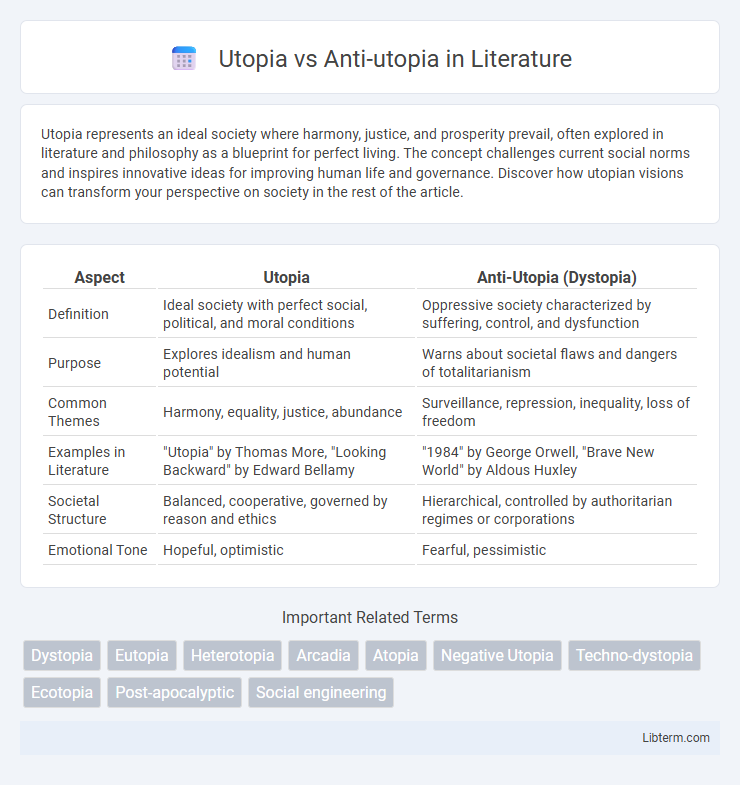Utopia represents an ideal society where harmony, justice, and prosperity prevail, often explored in literature and philosophy as a blueprint for perfect living. The concept challenges current social norms and inspires innovative ideas for improving human life and governance. Discover how utopian visions can transform your perspective on society in the rest of the article.
Table of Comparison
| Aspect | Utopia | Anti-Utopia (Dystopia) |
|---|---|---|
| Definition | Ideal society with perfect social, political, and moral conditions | Oppressive society characterized by suffering, control, and dysfunction |
| Purpose | Explores idealism and human potential | Warns about societal flaws and dangers of totalitarianism |
| Common Themes | Harmony, equality, justice, abundance | Surveillance, repression, inequality, loss of freedom |
| Examples in Literature | "Utopia" by Thomas More, "Looking Backward" by Edward Bellamy | "1984" by George Orwell, "Brave New World" by Aldous Huxley |
| Societal Structure | Balanced, cooperative, governed by reason and ethics | Hierarchical, controlled by authoritarian regimes or corporations |
| Emotional Tone | Hopeful, optimistic | Fearful, pessimistic |
Understanding Utopia: Definition and Origins
Utopia, derived from Sir Thomas More's 1516 work, represents an ideal society characterized by perfect social, political, and legal systems promoting harmony and justice. Rooted in Renaissance humanism, utopian concepts aim to explore visionary solutions for improving human conditions and addressing societal flaws. Understanding utopia involves recognizing its role as both a literary genre and a philosophical framework envisioning an attainable or imagined perfect world.
The Rise of Anti-utopia (Dystopia): Concept and Evolution
The rise of anti-utopia, or dystopia, reflects growing societal fears about technology, authoritarianism, and environmental collapse, marking a shift from idealized futures to cautionary narratives. Classic dystopian works like George Orwell's "1984" and Aldous Huxley's "Brave New World" illustrate how oppressive regimes and loss of individuality drive dystopian themes that critique contemporary social and political issues. The evolution of dystopian literature highlights the increasing complexity of modern anxieties, emphasizing surveillance, social control, and the erosion of human freedoms.
Key Features of Utopian Societies
Utopian societies are characterized by idealized social, political, and economic systems that promote harmony, equality, and justice among all members. Key features include communal ownership, advanced technology used for public good, and a governance structure that ensures fairness and participatory decision-making. These societies often prioritize sustainability, education, and the elimination of poverty and crime to create a perfect living environment.
Hallmarks of Anti-utopian (Dystopian) Worlds
Anti-utopian worlds feature pervasive surveillance, oppressive regimes, and the erosion of individual freedoms, creating environments dominated by fear and control. These dystopias often depict distorted realities where truth is manipulated, and citizens experience alienation or dehumanization. Social hierarchy and systemic inequality are common hallmarks, reinforcing authoritarian power and resistance suppression.
Literary Foundations: Classic Utopian and Dystopian Works
Classic utopian literature, such as Thomas More's *Utopia* and Edward Bellamy's *Looking Backward*, establishes idealized societies based on harmony, equality, and rational governance. In contrast, dystopian works like George Orwell's *1984* and Aldous Huxley's *Brave New World* depict oppressive, controlled environments highlighting surveillance, loss of individuality, and totalitarian rule. These foundational texts explore the extremes of societal organization, shaping the literary dichotomy between utopian aspirations and anti-utopian warnings.
Motivation Behind Utopian and Anti-utopian Narratives
Utopian narratives are motivated by the aspiration to envision ideal societies characterized by harmony, justice, and equality, often reflecting hopes for human progress and social reform. In contrast, anti-utopian or dystopian narratives arise from skepticism about perfectibility, highlighting the dangers of authoritarianism, loss of individuality, and systemic oppression. These opposing motivations drive authors to explore the potential consequences of idealistic ambitions versus the unintended harms of societal control.
Utopia vs Anti-utopia: Major Thematic Contrasts
Utopia represents an idealized society characterized by harmony, equality, and perfection, while Anti-utopia (dystopia) depicts a grim, oppressive world marked by injustice, surveillance, and suffering. Thematic contrasts between Utopia and Anti-utopia highlight hope and human potential versus fear and societal decay. These opposing visions explore the consequences of political ideologies, technological advancements, and human nature on social order and individual freedom.
Societal Impact and Real-world Inspirations
Utopian societies often inspire real-world movements by depicting idealized communities that emphasize equality, harmony, and technological advancement, influencing social reform and policy innovation. Anti-utopias, or dystopias, highlight societal flaws such as authoritarianism, surveillance, and environmental decay, serving as cautionary tales that prompt critical reflection and resistance against oppressive regimes. Both genres shape cultural discourse and political thought by examining potential futures rooted in existing social dynamics and historical contexts.
Modern Interpretations in Media and Culture
Modern interpretations of utopia in media often depict idealized societies emphasizing advanced technology, environmental harmony, and social equality, as seen in films like "Tomorrowland" and series such as "Star Trek." In contrast, anti-utopian narratives explore dystopian themes of surveillance, totalitarian control, and societal decay, prominently featured in works like "Black Mirror" and "The Handmaid's Tale." These portrayals reflect contemporary cultural anxieties surrounding technological progress, political power, and human rights.
The Future of Utopian and Anti-utopian Thought
Utopian and anti-utopian thought continues to shape the discourse on future societal models, emphasizing contrasting visions of idealism and caution. Emerging technologies and ecological challenges intensify debates, with utopian narratives inspiring innovation for sustainable living while anti-utopian perspectives warn against dystopian outcomes and authoritarian control. The future of these philosophical frameworks hinges on their ability to address complex realities through adaptive, critical, and inclusive approaches.
Utopia Infographic

 libterm.com
libterm.com